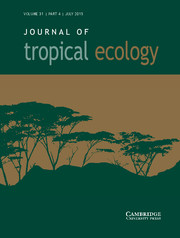Article contents
Tropical fruit production depends on wild insect communities: bees and lychees in Thailand
Published online by Cambridge University Press: 21 May 2021
Abstract
The importance of wild insects as pollinators of tropical tree crops has rarely been tested. Across 18 small-scale lychee orchards in northern Thailand, we evaluated the roles of different wild insects as pollinators and predators of pests in fruit production. Quantitative assessments showed that bees (Family Apidae) were strongly dominant (83%) among insect flower visitors, comprising four species in tribes Apini and four in Meliponini. Experimental manipulations of inflorescences showed that fruit production in these orchards was: (1) dependent on flower visits by wild insects because enclosure of inflorescences in mesh bags decreased fruit set (to one-fifth) and (2) not greatly limited by pollinator deficiencies, because hand pollination of unbagged flowers did not enhance fruit set. Pollination success, as indicated by the proportion of unmanipulated flowers setting fruit, correlated positively across orchards with the abundance of large-bodied Apidae (>7 mm; most were Apis species) and of Apini, and negatively with abundance of small-bodied Apidae and of all Meliponini, despite the latter being the commonest flower visitors. We conclude that larger-bodied bees are most likely to travel sufficiently far to import genetically diverse pollen, in this landscape-scale mosaic where non-orchard habitats (both agriculture and treed patches) were sufficient to sustain wild pollinators.
- Type
- Research Article
- Information
- Copyright
- © The Author(s), 2021. Published by Cambridge University Press
References
- 1
- Cited by



